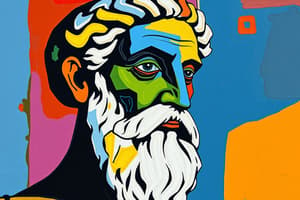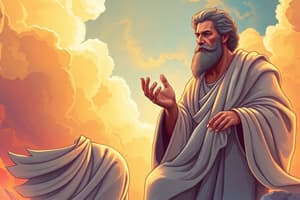Podcast
Questions and Answers
How did Thales of Miletus differ from his contemporaries in explaining natural phenomena?
How did Thales of Miletus differ from his contemporaries in explaining natural phenomena?
- He relied on traditional myths and stories to describe the workings of the world.
- He attributed natural events to divine intervention and supernatural forces.
- He sought to provide explanations based on theories and hypotheses, excluding myths. (correct)
- He focused solely on observable phenomena without attempting theoretical explanations.
What is the primary focus of the Socratic Method?
What is the primary focus of the Socratic Method?
- Transmitting knowledge from teacher to student.
- Prescribing solutions to philosophical problems.
- Encouraging critical questioning and examination of beliefs. (correct)
- Establishing definitive answers to complex questions.
Which of the following best describes Plato's concept of 'Dialectic'?
Which of the following best describes Plato's concept of 'Dialectic'?
- A method of debate where the goal is to defeat the opponent.
- A threefold approach including ethics, physics and debate that leads to agreement. (correct)
- A process of solitary contemplation to arrive at truth.
- A rhetorical technique used to persuade others of one's own beliefs.
What did Aristotle believe was the foundation of people's concepts and knowledge?
What did Aristotle believe was the foundation of people's concepts and knowledge?
How did Confucius believe individuals could inspire virtuous behavior in others?
How did Confucius believe individuals could inspire virtuous behavior in others?
According to Lao Tzu, what is necessary to truly follow the Dao?
According to Lao Tzu, what is necessary to truly follow the Dao?
What is Prospero Covar's framework for understanding Filipino identity based on?
What is Prospero Covar's framework for understanding Filipino identity based on?
How does Virgilio Enriquez define Sikolohiyang Pilipino?
How does Virgilio Enriquez define Sikolohiyang Pilipino?
What is Zeus Salazar known for proposing?
What is Zeus Salazar known for proposing?
What is a key characteristic of holistic thinking?
What is a key characteristic of holistic thinking?
Which of the following is an example of holistic thinking?
Which of the following is an example of holistic thinking?
What is the primary focus of partial thinking?
What is the primary focus of partial thinking?
What drives the need to philosophize?
What drives the need to philosophize?
How does philosophy improve problem-solving?
How does philosophy improve problem-solving?
What is the significance of having a holistic point-of-view in the process of doing philosophy?
What is the significance of having a holistic point-of-view in the process of doing philosophy?
What is the main concern of philosophy regarding 'the nature of truth'?
What is the main concern of philosophy regarding 'the nature of truth'?
What does Ayn Rand's 'Primary of Existence' assert?
What does Ayn Rand's 'Primary of Existence' assert?
What is a key characteristic of truth, according to the text?
What is a key characteristic of truth, according to the text?
What is the main difference between truth and opinion?
What is the main difference between truth and opinion?
What does the correspondence theory of truth propose?
What does the correspondence theory of truth propose?
According to the coherence theory of truth, when are ideas presumed to be true?
According to the coherence theory of truth, when are ideas presumed to be true?
What do pragmatists seek to do in philosophy?
What do pragmatists seek to do in philosophy?
According to Edmund Husserl, what attitude does science bring which is counterproductive to the human soul?
According to Edmund Husserl, what attitude does science bring which is counterproductive to the human soul?
What is the task of the analytic approach in philosophy?
What is the task of the analytic approach in philosophy?
What is the purpose of reasoning?
What is the purpose of reasoning?
What is a fallacy?
What is a fallacy?
What best describes the 'argumentum ad hominem' fallacy?
What best describes the 'argumentum ad hominem' fallacy?
What defines the 'argumentum ad baculum' fallacy?
What defines the 'argumentum ad baculum' fallacy?
What is the defining characteristic of the 'argumentum ad misericordiam' fallacy?
What is the defining characteristic of the 'argumentum ad misericordiam' fallacy?
What is the basis of the 'argumentum ad populum' fallacy?
What is the basis of the 'argumentum ad populum' fallacy?
What is the defining characteristic of the 'argumentum ad tradition' fallacy?
What is the defining characteristic of the 'argumentum ad tradition' fallacy?
What is assumed to be true in 'Petitio Principii'?
What is assumed to be true in 'Petitio Principii'?
A mistake in reasoning based on an insufficient amount of evidence best describes what?
A mistake in reasoning based on an insufficient amount of evidence best describes what?
What is the 'correspondence bias'?
What is the 'correspondence bias'?
Readily accepting information to reinforce one's own beliefs best describes which bias?
Readily accepting information to reinforce one's own beliefs best describes which bias?
Which bias best describes focusing on a certain aspect of a problem while ignoring other aspects?
Which bias best describes focusing on a certain aspect of a problem while ignoring other aspects?
Which of the following options best describes Cultural Bias?
Which of the following options best describes Cultural Bias?
What is the cognitive self?
What is the cognitive self?
The ability to connect and interact with another person best describes what?
The ability to connect and interact with another person best describes what?
How does a holistic perspective enhance one's understanding of life?
How does a holistic perspective enhance one's understanding of life?
Which of the following reflects the application of philosophy to daily life?
Which of the following reflects the application of philosophy to daily life?
In reasoning, what role do premises play in relation to the conclusion?
In reasoning, what role do premises play in relation to the conclusion?
Which of the following actions best demonstrates virtue, as described in the notes?
Which of the following actions best demonstrates virtue, as described in the notes?
How does the concept of 'embodied spirit' influence human actions?
How does the concept of 'embodied spirit' influence human actions?
Flashcards
What is Philosophy?
What is Philosophy?
Derived from “Philos” (love) and “Sophia” (wisdom). It involves thinking about the world and answering important questions.
What is Divine Wisdom?
What is Divine Wisdom?
Attributing achievements to God's help.
What is Human Wisdom?
What is Human Wisdom?
Wisdom gained through experience, knowledge, and good judgment.
What is Wisdom?
What is Wisdom?
Signup and view all the flashcards
What is the Socratic Method?
What is the Socratic Method?
Signup and view all the flashcards
What is Dialectic?
What is Dialectic?
Signup and view all the flashcards
Aristotle's belief:
Aristotle's belief:
Signup and view all the flashcards
Thales' approach:
Thales' approach:
Signup and view all the flashcards
Confucius' Belief
Confucius' Belief
Signup and view all the flashcards
Lao Tzu's Taoism
Lao Tzu's Taoism
Signup and view all the flashcards
Prospero Covar's Filipino Identity
Prospero Covar's Filipino Identity
Signup and view all the flashcards
Sikolohiyang Pilipino
Sikolohiyang Pilipino
Signup and view all the flashcards
Who is Zeus Salazar?
Who is Zeus Salazar?
Signup and view all the flashcards
Holistic Thinking
Holistic Thinking
Signup and view all the flashcards
Partial Thinking
Partial Thinking
Signup and view all the flashcards
Why do Philosophize?
Why do Philosophize?
Signup and view all the flashcards
The Need to Philosophize
The Need to Philosophize
Signup and view all the flashcards
Philosophy in Everyday Life
Philosophy in Everyday Life
Signup and view all the flashcards
What does Philosophy enable?
What does Philosophy enable?
Signup and view all the flashcards
What is Logic?
What is Logic?
Signup and view all the flashcards
Philosophy of Human Person
Philosophy of Human Person
Signup and view all the flashcards
Cosmology
Cosmology
Signup and view all the flashcards
Metaphysics
Metaphysics
Signup and view all the flashcards
Ethics
Ethics
Signup and view all the flashcards
Aesthetics
Aesthetics
Signup and view all the flashcards
Epistemology
Epistemology
Signup and view all the flashcards
Psychology
Psychology
Signup and view all the flashcards
Social Philosophy
Social Philosophy
Signup and view all the flashcards
Theodicy
Theodicy
Signup and view all the flashcards
Truth
Truth
Signup and view all the flashcards
Opinion
Opinion
Signup and view all the flashcards
Correspondence Theory
Correspondence Theory
Signup and view all the flashcards
Coherence Theory
Coherence Theory
Signup and view all the flashcards
Pragmatist Theory
Pragmatist Theory
Signup and view all the flashcards
Dialectic Method
Dialectic Method
Signup and view all the flashcards
Pragmatic Method
Pragmatic Method
Signup and view all the flashcards
Naturalistic Attitude
Naturalistic Attitude
Signup and view all the flashcards
Argumentum ad Hominem
Argumentum ad Hominem
Signup and view all the flashcards
Argumentum ad Baculum
Argumentum ad Baculum
Signup and view all the flashcards
Argumentum ad Misecordian
Argumentum ad Misecordian
Signup and view all the flashcards
Argumentum ad Populum
Argumentum ad Populum
Signup and view all the flashcards
Argumentum ad Tradition
Argumentum ad Tradition
Signup and view all the flashcards
Deductive Reasoning
Deductive Reasoning
Signup and view all the flashcards
Inductive Reasoning
Inductive Reasoning
Signup and view all the flashcards
Human Beings
Human Beings
Signup and view all the flashcards
Study Notes
Definition, Origin, and Concepts of Philosophy
- Philosophy comes from "Philos" (love) and "Sophia" (wisdom).
- Philosophy explores the world, the universe, and society through questioning.
- Thales of Miletus is considered the "Father of Philosophy" for his rational thinking instead of belief in Gods.
Kinds of Wisdom
- Divine Wisdom is perceived as a gift from God; acquired through seeking divine help.
- Human Wisdom is acquired through experience, knowledge, and good judgement.
- Knowledge is information and understanding, while wisdom is applying that information.
Notable Philosophers
Socrates (470 - 399 BCE)
- Known for the Socratic Method, which encourages critical questioning.
- The Socratic Method involved communication through probing questions.
Plato (428 - 348 BCE)
- Plato used dialectic: debating to find common agreement.
- Plato's groundwork involves dialects, ethics (right from wrong), and physics (environment and people).
- True knowledge, according to Plato, comes from understanding forms, not observation.
Aristotle (384 - 322 BCE)
- Aristotle stressed the importance of logic.
- Believed people's concepts and knowledge are based on perception.
Thales (624 - 546 BCE)
- Regarded as the Father of Philosophy.
- Explained natural phenomena using theories and hypotheses, not myths.
Confucius (551 - 479 BCE)
- Confucius did not focus on strict rules, but on virtuous living.
- Believed virtuous leaders inspire virtuous behavior in others.
Lao Tzu (6th Century BCE)
- Advocated Taoism (following the Dao).
- Suggested one must go beyond reading and thinking to follow the Dao.
Prospero Covar (mid 1970s)
- Described Filipino identity through the concepts of outside, inside, and depth
Virgilio Enriquez (1975)
- Defined Sikolohiyang Pilipino as Filipino experiences, ideas, and culture.
Zeus Salazar (late 1991)
- Proponent of reflective views in Philippine history
Holistic vs. Partial Perspective
- Holistic thinking considers large-scale patterns in systems.
- A big-picture mentality recognizes interconnectedness.
- Holistic medicine makes sense of problems using hollistic thinking.
- Partial thinking focuses on specific aspects
- People often use analytical perspectives to approach problems
Value of Philosophy
- Everyone can philosophize since humans tend to wonder and doubt.
- A philosopher is a good communicator.
- Philosophy allows better decisions and reflective thinking.
- Philosophizing arises from a love for wisdom and a desire for truth.
- Rene Descartes believed the need to philosophize comes from doubt.
Branches of Philosophy
- Logic is the science of correct reasoning.
- Philosophy of the Human Person examines humanity's destiny.
- Cosmology studies the origin and nature of the universe.
- Metaphysics explores reality beyond physics.
- Ethics studies human morality.
- Aesthetics studies art and beauty.
- Epistemology studies the theory of knowledge.
- Psychology studies human behavior.
- Social Philosophy studies principles governing human relations.
- Theodicy concerns God and justice.
Philosophical Reflection
- Philosophy helps one see the bigger perspective and ultimate purpose.
- Reflection lets one judge the reasonableness of actions and decisions.
- Philosophy helps to engage in critical analysis.
- Philosophy improves problem-solving and decision-making.
- Holistically evaluate situations before concluding.
Nature of Truth
- Philosophy seeks to determine the nature of truth.
- Ayn Rand: reality exists independently of perception.
Truth vs. Opinion
- Truth is validated knowledge based on facts.
- Opinion is a judgement not necessarily based on fact.
Truth
- Based on the facts of reality
- Can be confirmed with other sources
- Is independent of interpretation
Opinion
- Based on emotions.
- Open to interpretation.
- Cannot be confirmed.
- Inherently biased.
Theories of Truth
- Correspondence Theory: Ideas are true if they accurately reflect reality.
- Coherence Theory: Ideas are true if they are internally consistent.
- Pragmatist Theory: Ideas are true if they are useful and solve problems.
Philosophical Questions
- Philosophical questions have answers that are continuously debated.
- Philosophical questions can’t be settled by science, common sense or faith.
- Philosophical questions are of perennial interest to people.
Methods of Philosophizing
- Dialectic Method: the art of conversation.
- Used to clarify arguments and notions to seek agreement and truth.
- Pragmatic Method: Philosophy is made relevant by solving real-life problems.
- Phenomenological Method: science can be counterproductive
Reasoning and Fallacies
- Reasoning is generating new truths from known truths.
- Reasoning justifies statements based on other statements.
- A valid argument has premises that support the conclusion
Types of Reasoning
- DGS - Deductive (General to Specific)
- ISG - Inductive (Specific to General)
- AGSO - Abductive (General to Specific observation)
Common Fallacies
- Argumentum ad Hominem: Attacks the person, not the argument.
- Argumentum ad Baculum: Uses force or threats.
- Argumentum ad Misericordiam: Appeals to emotion, like pity.
- Argumentum ad Populum: Claims acceptability based on popularity.
- Argumentum ad Tradition: Claims acceptability based on long-standing tradition.
- Argumentum ad Ignorantiam: Claims something is true because it hasn't been proven false, and vice versa.
- Petitio Principii: Assumes the conclusion is true.
- Hasty Generalization: Draws a conclusion from insufficient evidence.
- Cause and Effect: Assumes a relationship between unrelated events.
- Fallacy of Composition: Assumes what's true of a part is true for the whole.
- Fallacy of Division: Assumes what's true of the whole is true for a part.
- Fallacy of Equivocation: Uses the same term with different meanings.
Kinds of Biases
- Correspondence Bias: Judges personality by actions, ignoring external factors.
- Confirmation Bias: Accepts information confirming existing beliefs, rejects conflicting information.
- Framing: Focuses on certain aspects and ignores others.
- Hindsight: Sees past events as predictable.
- Conflict of Interest: Having a vested interest in the issue.
- Cultural Bias: Analyzes issues based on cultural standards.
The Human Person
- Man: Represents the entire human race.
- Human: Refers to classifications and species.
- Human Being: Separates humans from other animals.
- Person: A self-aware, self-determining individual.
- Personhood: Describes the state of being a person with unique sacred status.
- Human Nature: Natural behavior distinguishing humans from animals.
- Human Person: Embodies soul, mind, and spirit.
Distinguishing a Human Person
Cognitive Self
- Non-physical
- Consists of beliefs, desires, dreams, and intentions
Physical Self
- Can be seen
Embodied Spirit
- Embodied spirit is the animating core living within each of us; drives our actions.
Human Person as Embodied Spirit
-
Self-awareness includes understanding of thoughts, emotions, identity, and actions.
-
Humans can connect and interact with others and can direct their own lives.
-
Humans have inherent value and importance given we have interiority
-
Virtue is practicing truth and avoiding bias by doing right..
Studying That Suits You
Use AI to generate personalized quizzes and flashcards to suit your learning preferences.




